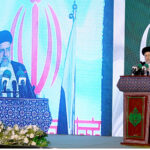By Shakil Ahmed
PESHAWAR, Apr 11 (APP): Peshawar, the provincial capital of Khyber Pakhtunkhwa situated on the eastern perimeter of Khyber Pass has significant historic, cultural and traditional importance due to its geographical position.
The city was once used as a stopover by raiders and conquerors that entered the Indian-subcontinent.
The Qissa Khawani Bazaar, a marketplace known for storytelling by visitors in the past, was one of the famous areas of Peshawar. The bazaar having labyrinth of alleyways was a stay-point of caravans heading towards Central Asian states for trade through neighboring Afghanistan.
According to history books, the caravans of traders recouped their energies in Peshawar before entering mountainous region of Khyber to reach Central Asian States. They shared experiences, tell stories and gossiped while sipping and enjoying Qehwa (green tea) in the bazaar of storytellers.

The marketplace is still a home to old green tea shops where cozy environment reminisced of the forgotten era. The bustling of visitors, the posture of tea makers and the banging of ageing kettles are attractions that force foreigner tourists to visit Qissa Khawani Bazaar, which was named Piccadilly of Central Asia by British Commissioner, Sir Edward Herbert.
The uniqueness of Qissa Khawani Bazar could be gauged from the fact that it was being visited by each and everyone who was heading towards Central Asia or travelling to Indian-subcontinent. The past fame of bazaar still attracts tourists who were often seen roaming to seek its ‘talismanic ambiance’.

But gone were the days when Qissa Khawai Bazaar was known for a storytelling place because the time has transformed it into a local business zone completely overshadowing ‘Stories and Story Telling’.
The growing demand of current economic scenario has led to mushroom growth of shops that are selling, herbs, aluminum utensils, dry fruits, stationery, garments, antiques, hosiery and growth of eateries including new entry of Biryani shops.
One can sway into the past after visiting old alleys on the back of Qissa Khawani Bazaar that are now packed with hotels selling Kabuli Pulao, steam roast chargha and tea houses, besides serving Qehwa to customers in a traditional way.
The backstreets of bazaar still complain of scarcity of space but the choking of passageways and rapid changes have failed to dominate and overpower the historic value and cultural importance of bazaar for which is still famous.
Among the shops situated on backstage of Qissa Khawani Bazaar, there is a tea house serving the traditional Qehwa to customers for the last nine decades. The worn torn walls of the tea house are still being felt vibrating to transpire the aftereffects of stories told by visitors in the place during last 90 years.
Talking to APP, owner of the tea house, Fazal-ur-Rehman said he belongs to neighboring Mohmand Agency and has chosen Peshawar as his abode. He is running the place for the last 58 years after retirement of his father from the business.
Narrating the history of old city of Peshawar, he said there were 12 gates of city including Kohati Gate, Sarki Gate, Kabuli Gate, Sard Cha Gate, Lahori Gate, Asamai Gate, Aasia Gate, Hastnagri Gate and Ganj Gate and the traders coming from Afghanistan chose to rest in Peshawar before embarking on remaining journey.
He said travelers were used to tell each other about details of their journeys and experiences while staying overnight in the Qissa Khawani Bazar. He said it was not possible for travelers to head forward without staying in the Caravanserai of Peshawar where new friendships were made during episodes of storytelling.
Qissa Khawani Bazar was not only famous for storytelling but it acclaimed new recognition in present because of its neighborhood where families of renowned artists once lived.
These artists that are part of Indian film industry’s hall of fame and still revered by dwellers of old walled city due to their lineage associated with Qissa Khawani Bazar of Peshawar. These artists still recall their days spend in Qissa Khawani and the indelible memories relating to those moments.
Adjacent to Qissa Khawani Bazar, Dhaki Naalbandi produced, Raj Kapoor, an artist who and his family ruled film industry of subcontinent for four decades.
His descendants whether associated with acting on production are inseparable part of Indian film industry. Raj Kapoor left Peshawar for Bombay (Mumbai) in age of 22 years and ascended ladder of fame in just few years after venturing into film industry of subcontinent.
Legendary actor, Yousaf Khan (Dilip Kumar) born in a house of Dooma Gali near Qissa Khawani. He was born in December 1922 and his family left Peshawar for Bombay in 1930. Residents of Peshawar still feel proud to show their association with Dilip Kumar and Kapoor’s.

Qissa Khawani Bazaar is also known in history for the gory incident of 1930 wherein scores of protestors were killed by British Imperil forces. The unarmed protestors raising voice for freedom were fired upon by British forces brutally in the bazaar.
According to government record 20 protestors were killed while unofficial record confirms death of 400 innocent citizens. The Shuhda monument that stands in the middle
of Qissa Khawani Bazars still reminds the callousness of imperialists and insurmountable determination of protestors.

The repercussions of killing, the stories of past and the accomplishments of residents are part of history books but the tea houses of the old bazaar are still serving customers the Qehwa with the same taste that was enjoyed by caravans of travellers in past.




